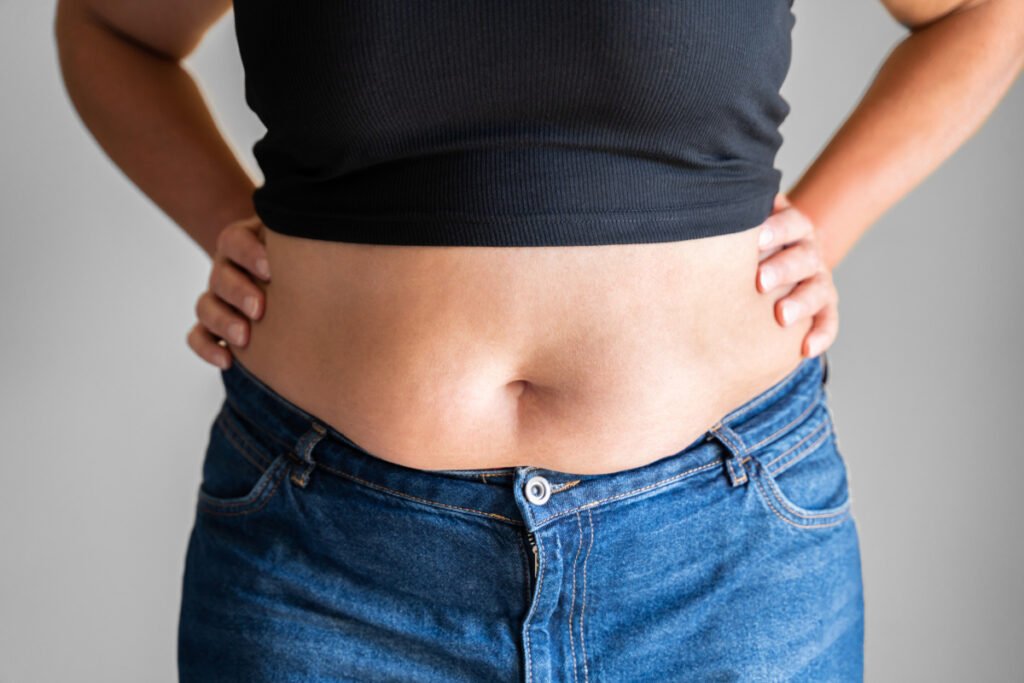Is it weight gain or bloating? Here’s How to Tell

It can be very frustrating to be bloated during the weight loss process, as bloating and weight gain often share similar signs: tighter fitting clothes, protruding stomach, a feeling of puffiness, and of course – higher numbers on the scale. In this post, our Rancho Cucamonga weight loss surgeons explain how you can tell the difference between weight gain and bloating, and how you can reduce bloating so it doesn’t interfere with your weight loss journey!
Understanding bloating
Bloating is a condition where your stomach feels swollen and full due to an excess buildup of gas in the digestive system or a disturbance in the movement of the muscles in the gastrointestinal tract. Some people do not feel any discomfort while others feel very uncomfortable when they are bloated. Bloating is a pretty typical occurrence and affects most people from time to time, but it can be particularly distressing when you’re focused on losing weight and improving your health.
Causes of bloating
Common causes of bloating vary widely and include:
- Too much salt
- Carbonated beverages
- Foods like beans and cruciferous vegetables
- Eating too quickly
- Constipation
- Chewing gum
- Swallowing air
Temporary vs. chronic bloating
Temporary bloating is typically triggered by one (or more) of the causes listed above and resolves on its own within a few hours to a day or two. Chronic bloating persists over longer periods and may indicate underlying health issues such as irritable bowel syndrome (IBS), celiac disease, food intolerances, or other gastrointestinal disorders. If you are bothered by bloating, be mindful of when you experience it to help you pinpoint and address the root causes to limit or prevent it as you go along your weight loss journey.

Key differences between weight gain and bloating
Body mass metrics
When you’re bloated, you’ll likely notice a swollen or protruding abdomen that can make your clothes feel tighter, but it won’t cause a significant, long-lasting increase in your actual body weight because bloating is caused by gas or fluid retention rather than fat accumulation. Weight gain is due to actual fat accumulation and tends to be more evenly distributed across the body, so you’ll see more volume in not just the abdomen but also areas like the thighs, hips, and arms, and an increase in both body weight and overall body measurements.
Duration and frequency
Bloating is usually short-lived and subsides once the underlying issue—certain foods, eating habits, or digestive issues—is resolved. Weight gain takes longer to manifest and occurs over a longer period because of factors like a sustained caloric surplus, hormonal changes, or a sedentary lifestyle. Weight gain will not resolve on its own and requires lifestyle changes such as diet and exercise modifications to reverse.
Unlike bloating, weight gain tends to be more evenly distributed across the body, often settling in the abdomen but also areas like the thighs, hips, and arms.
Tips for managing bloating
Many causes of bloating can be prevented or managed with some simple lifestyle adjustments:
- Eat slowly and mindfully: Eating too quickly can cause you to swallow air and may lead to bloating, so we recommend eating at a relaxed pace and taking time to enjoy your meal.
- Avoid carbonated beverages: Drinks like soda and sparkling water contain carbon dioxide, which encourages gas buildup in the stomach.
- Incorporate fiber gradually: While fiber is essential for digestive health, increasing your intake too quickly can cause bloating. You’ll need to add fiber-rich foods such as fruits, vegetables, and whole grains to your diet gradually to gently allow your digestive system to adjust.
- Limit high-sodium foods: A high-salt diet can cause your body to retain water and feel bloated so look for low-sodium options when available and prioritize fresh, whole foods over processed items.
- Stay active: Regular exercise helps keep your digestive system moving and can help encourage regular bowel movements to prevent constipation. There’s no need to over-exert yourself with high-impact, intense workouts, simply try to be active for at least 30 minutes each day most days of the week.
Paying attention to what you eat and drink and incorporating some healthy habits into your daily routine will help keep the bloat at bay so you can stay more comfortable throughout your weight loss journey. Remember: small changes can make a big difference in how you feel!
When to seek professional help
If you experience persistent bloating that doesn’t resolve after adjusting your diet and activity levels, or if bloating causes severe pain, unexplained weight loss, or changes in bowel habits, it’s time to consult a healthcare provider, as these could be signs of a more serious underlying condition that requires medical attention.
At Surgical Arts of Inland Empire, our expert team of medical weight loss doctors are dedicated to helping you achieve your health goals and improve your overall well-being. We understand the challenges of weight loss and are here to support you every step of the way. If you have concerns about bloating or any other aspect of your health, please contact us today. Our experienced surgeons and supportive staff are ready to help you live a healthier, happier life!
